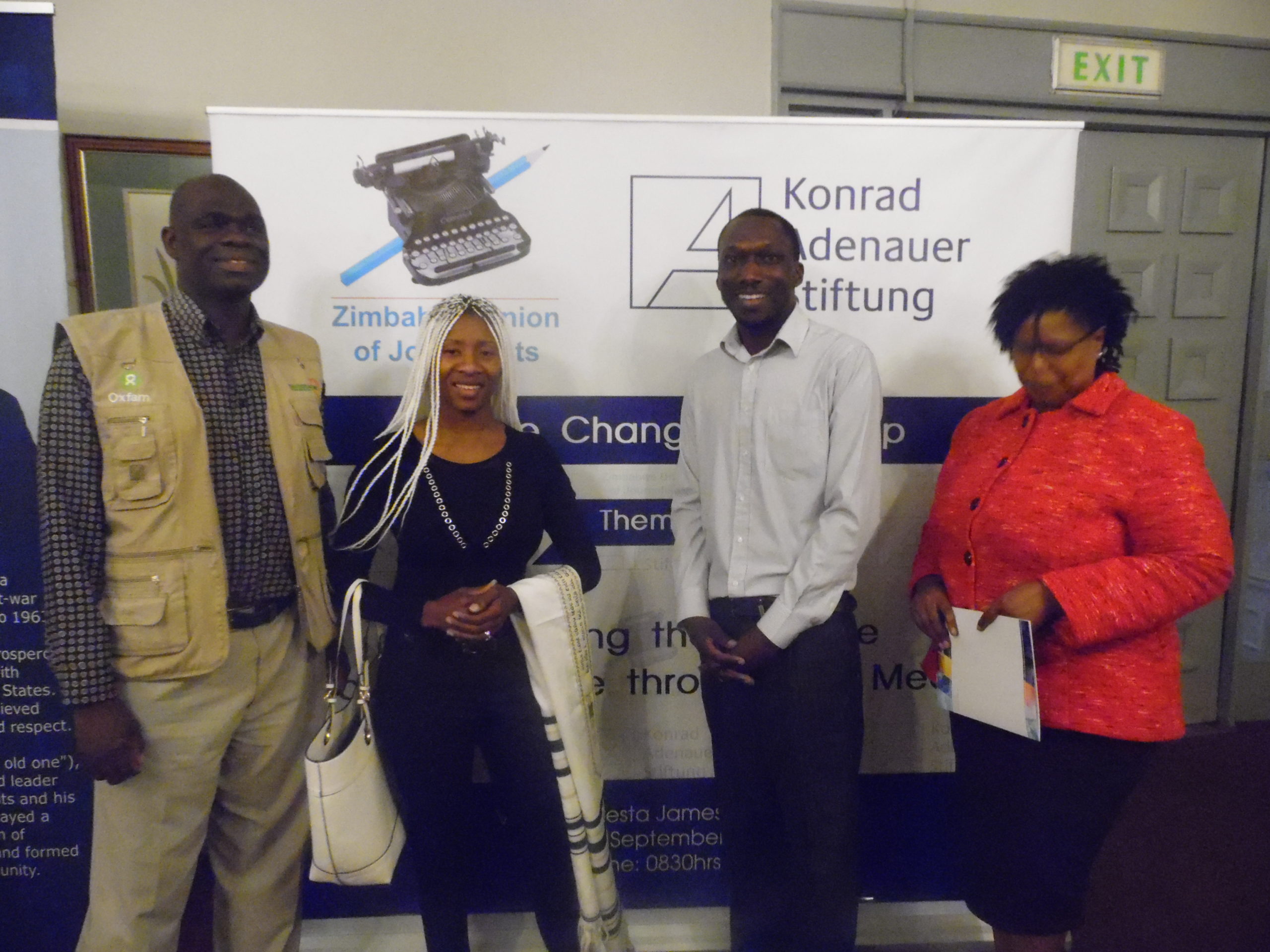By Byron Mutingwende
The media plays a critical role in the dissemination of climate change information, an official from the Government of Zimbabwe has said.
In his remarks at a climate change reporting workshop held at Cresta Jameson Hotel in Harare on 7 September 2017, Tirivanhu Muhwati, a Climate Change Scientist in the Climate Change Management Department of the Ministry of Environment, Water and Climate (MEWC) underscored the critical role that the media plays in disseminating climate change information.
“The media plays a critical role in disseminating climate change information. It influences people’s thinking and lines of thought on a particular subject. It is therefore important in public education and awareness. The MEWC has been working closely with various media houses and appreciates the time and space dedicated by them to climate change matters. Their effort is required in highlighting best practices in adapting to climate change among communities and are critical in pointing out matters where the government could do better,” Muhwati said.
Foster Dongozi, the Secretary General of the Zimbabwe Union of Journalists (ZUJ) said the workshop, held under the theme, “Popularising the climate change debate through the media” sought to build the capacities of Zimbabwean journalists to understand and report climate change from an informed perspective. The meeting was held with support from Konrad Adenauer Stiftung (KAS).
“ZUJ and KAS are of the belief that if the media has proper understanding of climate change, they will disseminate correct information about the phenomenon,” Dongozi said.
Climate change is probably the most topical issue of the 21st Century since it is affecting all facets of socio-economic development. Muhwati said the government of Zimbabwe of Zimbabwe has created a fully-fledged department of climate change in the MEWC. The department is tasked with crafting the policies; strategies and plans as well as mainstreaming climate change into the country’s development agenda.
On the international arena, Zimbabwe has now deposited its instrument of ratification of the Paris Agreement with the United Nations Secretary-General. The provisions of the Paris Agreement now bind the country with effect from the 6th of September 2017.
According to the United Nations Framework Convention on Climate Change (UNFCCC), climate change is a change of climate attributed directly or indirectly to human activity that alters the composition of the global atmosphere and which is in addition to natural climate variability observed over comparable time periods. The Intergovernmental Panel on Climate Change (IPCC) defines climate change as a change in climate over time whether due to natural variability or as a result of human activity.
In general, climate change refers to long-term fluctuations in temperature, precipitation, wind, and other elements of the earth’s climate system.
Climate change impacts have a widespread effect on social and economic development. It affects climate sensitive sectors such as water, agriculture, energy, health and natural resources among others. Extreme weather events such as floods, droughts and storms affect community livelihoods and infrastructure, just to mention a few.
“The impacts of climate change or hazards on social and economic development, climate sensitive sectors such as water, agriculture, livestock, energy, health and biodiversity are enormous, given the reliance of the majority of Zimbabwe’s population on the sensitive sectors and current levels of poverty. The country’s vulnerability is also increased by our lack of the social, technological and financial resources required to adapt to and mitigate climate change (autonomous or reactive adaptation rather than anticipatory or proactive adaptation),” Muhwati said.
He added that disaster risk management is important in reducing the impacts and losses from climate change and is central to adaptation.
“Climate risk management and adaptation planning need to be integrated into mainstream decision making, budgeting and planning in government. Climate Change Adaptation activities should be relevant to the local community. Policy and gender are cross cutting issues in climate change adaptation hence they need to be mainstreamed in all developmental activities.”
Sherpard Zvigadza, the Climate Policy Advisor of ZERO Regional Environment Organisation said for effective popularisation of climate issues, the Media has a role to play in a big way.
“For this effectiveness, media has to understand that Climate is a technical issue and hence Journalists need to understand the language to ensure that its simplified for the ordinary citizens to understand. Inversely, they can also engage the policy makers on how best they can make quick decisions to action on climate related matters that are affecting the rural and urban communities in Zimbabwe. Media is the watchdog. By doing this, certain actions are speeded up and debates are promoted.
“We however, applaud this meeting for this very same purpose, but urge institutions responsible for the media curriculum as they study, to include Climate journalism module. This meeting is a small step towards this,” Zvigadza said.






